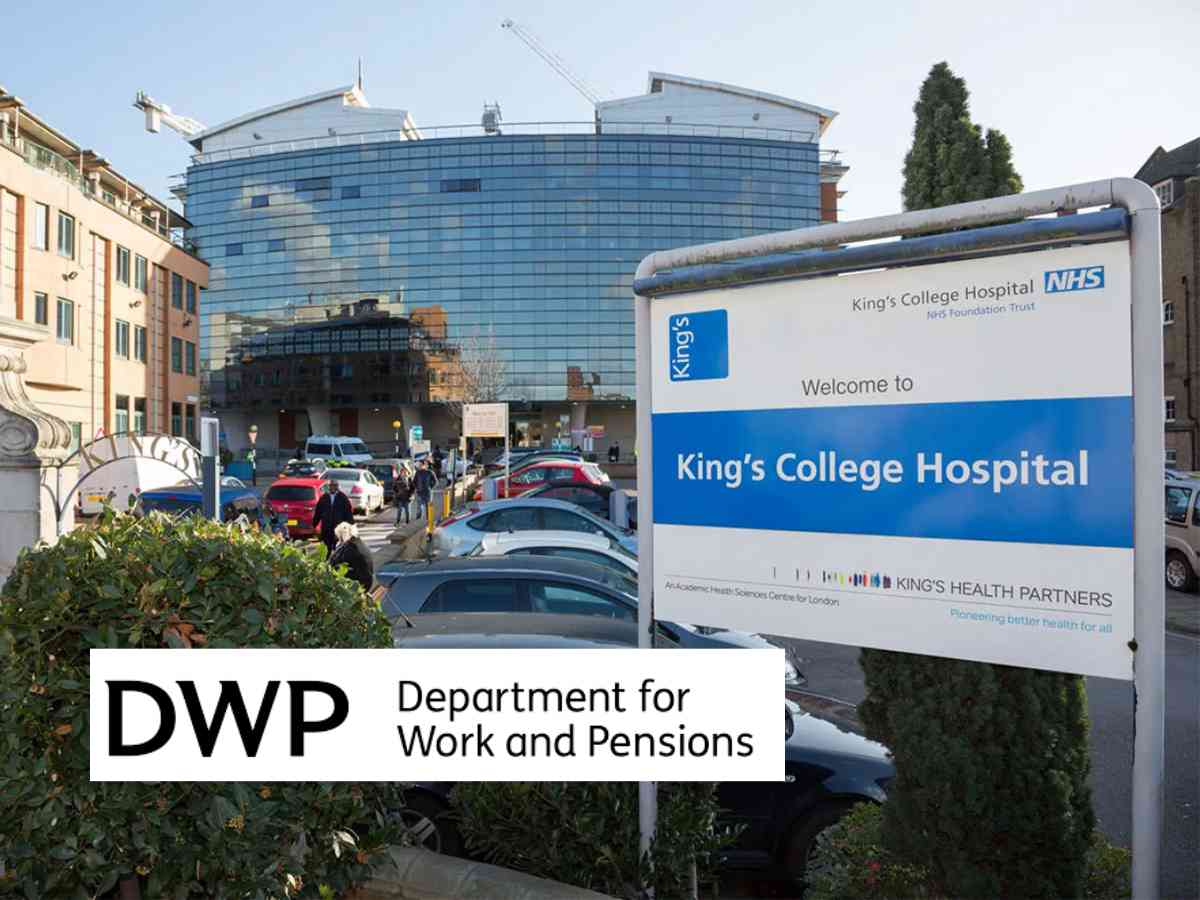New articles in the Times and the Guardian look to be little more than a cut and paste job from a government press release. What were both servile client media lapdogs banging on about on behalf of the new Labour cabinet ministers on the block? Well, that would be yet another back-to-work scheme, courtesy of the Department for Work and Pensions (DWP) tightening its grip further over the NHS. This is by putting job advisors in hospitals, via DWP NHS co-working.
Most significantly though, the pair of outlets missed something important about the new plans. Crucially, this vital detail regards a notorious psychologist and his harmful model for trivialising patients living with certain chronic physical illnesses: in particular, myalgic encephalomyelitis (ME).
DWP NHS co-working: Labour’s plan for job advisors in hospitals
On 3 October, both the Guardian and the Times announced the Labour government’s new scheme to post job advisors into NHS hospitals. Of course, this is part of its broader plans for pushing long-term sick people back to work.
So once again, the government is blurring the lines between the DWP and the NHS. Obviously, its latest ploy will mean people medical support for mental health conditions will face the prospect of employment advisors telling them to get a job to fix their problems.
However, the timing of the two articles also revealed something else. That is, the extent of the mainstream media’s complicity in manufacturing consent for the government’s back to work agenda. For one, it seems that the outlets plucked it all straight out of a government press release.
Firstly, the phrasing in parts of the two articles are almost carbon copies of one another. Compare and contrast, from the Times:
Liz Kendall, the work and pensions secretary, and Wes Streeting, the health secretary, want to expand a model in place at the Maudsley hospital in south London, which uses employment advisers to offer its patients help looking for work, writing CVs, doing interviews and linking them with local employers.
And from the Guardian article:
Wes Streeting, the health secretary, and Liz Kendall, the work and pensions secretary, are understood to want to expand a model used at the Maudsley psychiatric hospital, in south London, which deploys employment support, such as job seeking, CV writing and interview training.
Then, there’s the fact the outlets both use some of the very same quotes. And of course, the two articles went out on the exact same day. Parroting a strategically-timed government press release then? It seems extremely likely.
Obviously, the Guardian counterweighted some of the cut and paste back-to-work rhetoric with commentary from disability charity Scope director James Taylor. So, it at least tried, or attempted to appear like it’s pushing back against the new Labour government for maligning chronically ill and disabled people out of work. We’ll give it that much – though it hardly makes up for the damage uncritically promoting this will do.
Work as a health outcome guff again
Predictably however, both articles were full of the kind of perverse, social security claimant-shaming rhetoric we’ve been seeing the corporate media ramp up in recent months.
There was the work as a health outcome malarkey, naturally. Primarily, this came in a quote from the chair of South London and Maudsley NHS foundation, Norman Lamb, who said:
every clinical team across the country [should be] thinking employment is a legitimate and important goal of recovery for people
Next came more disabled claimant-bashing. He followed it up with the fact the scheme was:
not about forcing people into employment or doing anything that’s not right for them
But instead about:
recognising the importance to people of the dignity and self-worth that employment brings
So, shaming people not in work as having no dignity, then? Got it. And if that sounds familiar, that’s because everyone from the new PM to the NHS director of mental health have been bleating on with this ableist dogwhistle.
Largely then, both the right-wing Murdoch mouthpiece the Times, and liberal outlet the Guardian are serving as dutiful stenographers for the government’s bid to coerce chronically ill and disabled people into work.
Most notably however, neither paper picked up on one key detail about the job advisors in hospitals scheme the likely government press release was lauding. This was in relation to the fact that it was a model from Maudsley psychiatric hospital.
The hospital of psychologist Simon Wessely
Crucially, what the Guardian, and the Times failed to mention about this DWP NHS co-working is that this happens to be the hospital where a notorious psychologist practices, and is a non-executive director.
This would be one Simon Wessely – whose name is only all too familiar for people living with myalgic encephalomyelitis (ME) – and not in a good way. He’s the infamous psychologist who supported and shaped the flawed PACE trial. This was, as the Canary’s Steve Topple has previously explained:
a study, part-funded by the UK government, into treatment for ME. It found that people could recover from the disease by having cognitive behavioural therapy (CBT). In other words, people living with a very-real, viral-based illness should just ‘think themselves better’. Essentially, the trial pushed the notion that the disease was part-psychosomatic or ‘made up’ by patients.
Wessely was central to pushing out the PACE trial through the media. And as I’ve reported:
it was also Wessely and his band of biopsychosocial science chums who first started tarring ME as something psychological. Specifically, in the 1980s, he and his colleagues began pumping out articles that promulgated the cognitive behavioural model of ME.
This entrenched its psychosomatic origin and pushed cognitive behavioural therapy (CBT) and graded exercise therapy (GET) as the dominant treatment methods.
Wessely did all this, and has a chequered history of psychologising physical illnesses to boot.
Punching down on mental health patients for a past-time
But that’s not all. In 2017, Theresa May’s government got him to review the Mental Health Act. He punched down on mental health patients in this, as Topple wrote on this too:
In it, he pushed the emphasis on the patient leading what treatment they had; ‘self-management’ if you like. This seems good on paper. But in reality, it could leave patients vulnerable. Because if treatments don’t work, then the blame for this can be pushed onto the patient for ‘not trying hard enough’. This absolves medical professionals, and ultimately the system, of responsibility.
In light of the fact this ‘employment support’ scheme at Maudsley is to help people with mental health problems, this clearly raises some red flags right away.
Now, Wessely sits at the top of the NHS’s decision-making structure. In January 2023, the NHS appointed him to its board. In other words, Wessely has an outsized role calling the shots across the entire healthcare service.
Moreover, South London and Maudsley NHS Trust itself is an infamous actor in this biopsychosocial scandal as well. This is the trust which runs the existing scheme across four boroughs in London.
But, it’s also this NHS trust that has been central to promoting the harmful approach to ME. Specifically, with King’s College London, it has run the NIHR Biomedical Research Centre. There, the service has long pushed GET and CBT for people living with ME. Wessely is once again the common denominator in this too – since he’s a professor at the university. Moreover, he also works as a consultant psychologist at King’s College hospital, alongside Maudsley.
Maudsley says ‘everyone can work’
So, what does this scheme at the hospital right at the very centre of the ME psychologising medical scandal entail?
It’s own website sums this up best:
Work Well is a network of nine employment support teams based across South London and Maudsley.
Our teams are embedded within clinical services, working closely with clinicians and therapists to improve the wellbeing and mental health of our clients.
Firstly, it’s worth noting that this is different from the WorkWell work programme the Canary has previously written about. You can read more about that here.
However, it still mostly appears to be a rehash and collation of other existing programmes. The two key ones it highlights is Individual Placement and Support (IPS), and NHS Talking Therapies. The Canary’s Steve Topple has written about both of these, and how they signal the DWP sinking its claws further into the NHS. Significantly, he highlighted how it was the Blair era Labour government who instigated this idea. However, it was the Tories that implemented it. So, it’s hardly a surprise that the new Labour government – with Blair’s health secretary Alan Milburn as its advisor – is also running with and making plans to expand on it.
On this type of DWP NHS co-working arrangement, clinical psychologist Dr Jay Watts previously told the Canary that:
This ‘back to work’ obsession places huge demand on patients to fulfil the neoliberal dream. One whereby health is linked to how much one can contribute to the public purse. But this is foreclosing the reality of long-term disability… So we must refuse the insistence that work is a meaningful health outcome in mental health services. We must instead recommit to patient (not government) centred care.
Most tellingly of all then, the Work Well service describes its mission as:
to support people in achieving their own career goals. We believe everyone can work, and people should have choice about the type of work they want to do, and when to do it.
Of course, that pretty much says it all. The NHS trust has founded the scheme on the belief that “everyone can work”. And that’s precisely the problem – because that quite literally isn’t the case at all.
What it suggests is that the service is there to push mental health patients – and chronically ill people with physical illnesses it psychologises – back to work. Vitally, it implies it will do so even if this means their health will deteriorate as a result.
DWP NHS co-working: the end goal is capitalism
If that weren’t alarming enough, the website talks of the services it provides to employers. Specifically, it offers a:
free recruitment and workplace wellbeing service for local employers (Employ Well)
Crucially, it states that it will support employers:
with recruitment needs by matching your vacancies with our skilled, talented and motivated clients
So, there we have it: this is what the so-called employment support is really all for. It’s designed to place mental health patients at the mercy of parasitic capitalist employers. The website helpfully gives two examples of the sorts of predatory corporations involved in this already. One was big polluter Gatwick Airport. The other is the profiteering Royal Mail Group, that makes big money for its bosses, while shitting on its employees.
At the end of the day, this is what these types of so-called employment support schemes really boil down to. It’s what the PACE trial and the overall psychologisation of ME was always about too. Wherever the government can, it will push people into work, no matter the risks to their health. And all so it can deny people health-related social security while forcing them into the hands of vulture health insurance companies.
Most of all, job advisors in hospitals is to the benefit of rich corporate capitalist extortionists everywhere. That is, companies ready to squeeze every last drop of profit from the chronically ill and disabled people these government schemes prey upon, relentlessly, and seemingly without remorse.
Featured image via the Canary




